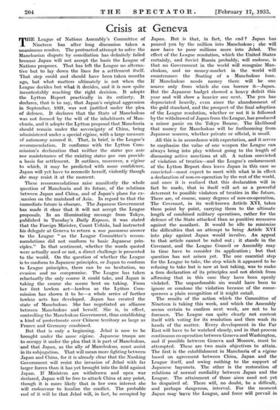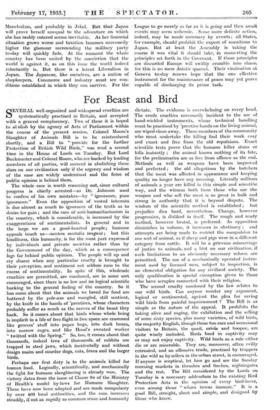Crisis at Geneva T HE League of Nations Assembly's Committee of
Nineteen has after long discussion taken a unanimous resolve. The protracted attempt to solve the Manchurian dispute by conciliation has definitely failed because Japan will not accept the basis the League of Nations proposes. That has left the League no alterna- tive but to lay down the lines for a settlement itself. That step could and should have been taken months ago, but what matters ultimately is not when the League decides but what it decides, and it is now quite incontestably reaching the right decision. It adopts the Lytton Report practically in its entirety. It declares, that is to say, that Japan's original aggression in September, 1081, was not justified under the plea of defence. It declares that the State of Manchukuo was not formed by the will of the inhabitants of Man- churia, and it adopts the Lytton proposal that Manchuria should remain under the sovereignty of China, being administered under a special rtime, with a large measure of autonomy assured it. That, in brief, is the League's recommendation. It conforms with the Lytton Com- mission's declaration that neither the status quo ante nor maintenance of the existing status quo can provide a basis for settlement. It outlines, moreover, a regime to which, it may be predicted with some confidence, Japan will yet have to reconcile herself, violently though she may resist it at the moment.
These recommendations raise manifestly the whole question of Manchuria and its future, of the relations between Japan and China, and of Japan's plans for ex- .)ansion on the mainland of Asia. In regard to that the immediate future is obscure. The Japanese Government has made it clear that it will not accept the League proposals. In an illuminating message from Tokyo, published in Tuesday's Daily Express, it was stated that the Foreign Minister, Count Uchida, had instructed his delegate at Geneva to return a non possumus answer to the League "as the League Committee's recom- mendations did not conform to basic Japanese prin- ciples." In that sentiment, whether the words quoted were actually used or not, a direct challenge is presented to the world. On the question of whether the League is to conform to Japanese principles, or Japan to conform to League principles, there can be no hesitation, no evasion and no compromise. The League has taken reluctantly the only course it could take, and Japan is taking the course she seems bent on taking. From her first lawless act—lawless as the Lytton Com- mission has shown it to be—a whole series of further lawless acts has developed. Japan has created the 'state of Manchukuo. She has negotiated an alliance between Manchukuo and herself. She is, in effect, controlling the Manchukuo Government, thus establishing 'a kind of protectorate over Chinese territory as large as France and Germany combined.
But that is only a beginning. Jehol is now to be brought under the same regime. Japanese troops are to occupy it under the plea that it is part of Manchukuo, and that Japan, as the ally of Manchukuo, must assist in its subjugation. That will mean more fighting between Japan and China, for it is already clear that the Nanking Government will resist the invasion of Jehol with far larger forces than it has yet brought into the field against Japan. If Ministers are withdrawn and open war declared, Japan will be free to attack China at any point, though it is more likely that in her own interest she will endeavour to localize the conflict. The probable end of it will be that Jehol will, in fact, be occupied by Japan. But is that, in fact, the end ? Japan has poured yen by the million into Manchukuo ; she will now have to pour millions more into Jehol. The effect of the League resolution, which the United States certainly, and Soviet Russia probably, will endorse, is that no Government in the world will recognize Man- chukuo, and no money-market in the world will countenance the floating of a Manchukuo loan. If Manchukuo needs money there will be one source only from which she can borrow it—Japan. But the Japanese budget showed a heavy deficit this year and will show a heavier one next. The yen has depreciated heavily, even since the abandonment of the gold standard, and the prospect of the final adoption of the League resolution, whether or not it is followed by the withdrawal of Japan from the League, has produced a minor panic on the Tokyo Bourse. The likelihood that money for Manchukuo will be forthcoming from Japanese sources, whether private or official, is small.
• All. this is in accordance with expectation, and it serves to emphasize the value of one weapon the League can always bring into play without going to the length of discussing active sanctions at all. A nation convicted of violation of treaties—and the League's endorsement of the Lytton Report does leave Japan in this case so convicted—must expect to meet with what is in effect a declaration of non-co-operation by the rest of the world, and once it is realized that this declaration will in fact be made, that in itself will act as a powerful deterrent to possible violators of treaties in the future. There are, of course, many degrees of non-co-operation. The Covenant, in its well-known Article XVI, takes them point by point, carrying them to the ultimate length of combined military operations, rather for the defence of the State attacked than as punitive measures against the assailant. It would be idle to minimize the difficulties that an attempt to bring Article XVI into play against Japan would involve. An appeal to that article cannot be ruled out ; it stands in the Covenant, and the League Council or Assembly may in time have to consider its application ; but that question has not arisen yet. The one essential step for the League to take, the step which it appeared to be refusing to take but is now at last taking, was to make a firm declaration of its principles and not shrink from affirming that in this case they have been openly violated. The unpardonable sin would have been to ignore or condone the violation because of the conse- quences a plain recognition of it might entail.
The results of the action which the Committee of Nineteen is taking this week, and which the Assembly seems certain to confirm next week, are not to be foreseen. The League can quite clearly not content itself with voting for its resolution and then wash its hands of the matter. Every development in the Far East will have to be watched closely, and in that process continuous co-operation between Geneva and Washington, and if possible between Geneva and Moscow, must be attempted. These are two main objectives to attain. The first is the establishment in Manchuria of a regime based on agreement between China, Japan and the League itself, and owing nothing to the support of Japanese bayonets. The other is the restoration of relations of normal cordiality between Japan and the League. The attainment of those aims need not yet be despaired of. There will, no doubt, be a difficult, and perhaps dangerous, interval. For the moment Japan may leave the League, and force will prevail in Manchukuo, and probably in Jehol. But that Japan will prove herself unequal to the adventure on which she has rashly entered seems inevitable. As her financial situation grows worse and taxation becomes necessarily higher the glamour surrounding the military party to-day will quickly fade. At the moment the whole country has been united by the conviction that the world is against it, as on this issue the world indeed reluctantly is. But there is a latent Liberalism in Japan. The Japanese, like ourselves, are a nation of shopkeepers. Commerce and industry must see con- ditions established in which they can survive. For the • League to go merely as far as it is going and then await events may seem unheroic. Some more definite action, indeed, may be made necessary by events ; all States, for example, should prohibit the export of munitions to Japan. But at least the Assembly is taking the course it was vital it should take, in reasserting the principles set forth in the Covenant. If those principles are discarded Europe will swiftly crumble into chaos. for this is no mere Asiatic quarrel. Their vindication at Geneva to-day renews hope that the one effective instrument for the maintenance of peace may yet prove capable of discharging its prime task.







































 Previous page
Previous page